Tool Kits and Videos
Toolkits
Multi-tiered Systems of Support (MTSS) Toolkit
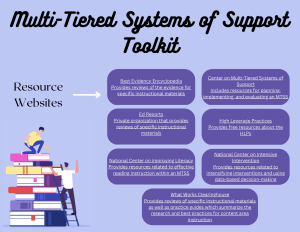 This toolkit provides an overview of the components in a multi-tiered system of support (MTSS) and how students with disabilities can and should participate within all tiers. Using this toolkit will help you learn the importance of a strong Tier 1 core instruction foundation for all students as well as how targeted (Tier 2) and intensive (Tier 3) supports are provided for students regardless of dis/ability. The toolkit includes both book and online resources.
This toolkit provides an overview of the components in a multi-tiered system of support (MTSS) and how students with disabilities can and should participate within all tiers. Using this toolkit will help you learn the importance of a strong Tier 1 core instruction foundation for all students as well as how targeted (Tier 2) and intensive (Tier 3) supports are provided for students regardless of dis/ability. The toolkit includes both book and online resources.
The toolkit is developed by Dr. Rachel Brown Chidsey, a nationally renowned expert in multi-tiered systems of support for academics, and inclusive teaching practices. She has more than 25 years of experience in education and has authored dozens of articles, and many books on supporting struggling learners and students with disabilities. She is currently the president of the Maine State Council for Exceptional Children.
Self-Advocacy Toolkit
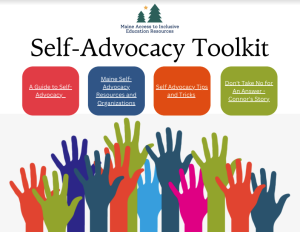 MAIER’s Self-Advocacy Toolkit, (and the associated video linked below) designed by Connor Archer, provides accessible and valuable information to help those with diverse learning needs advocate for themselves. No one knows you better than yourself, and thus you know what works best for you across various learning environments. But, sometimes, it is difficult to figure out the best way to advocate for those needs. Within this toolkit, Connor provides some tools and hints on how best to get your needs met respectfully and effectively. Whether you need to advocate for yourself within a K-12 school environment, within a workplace setting, or within your community, you know what you need; learn the best ways to get those needs met. Check out this tool kit as well as the video below. Connor is also available during various dates across the winter to provide a question-and-answer session related to advocacy. If you’re interested in attending that Q&A session, check out the self-advocacy Community of Practice page facilitated by MAIER.
MAIER’s Self-Advocacy Toolkit, (and the associated video linked below) designed by Connor Archer, provides accessible and valuable information to help those with diverse learning needs advocate for themselves. No one knows you better than yourself, and thus you know what works best for you across various learning environments. But, sometimes, it is difficult to figure out the best way to advocate for those needs. Within this toolkit, Connor provides some tools and hints on how best to get your needs met respectfully and effectively. Whether you need to advocate for yourself within a K-12 school environment, within a workplace setting, or within your community, you know what you need; learn the best ways to get those needs met. Check out this tool kit as well as the video below. Connor is also available during various dates across the winter to provide a question-and-answer session related to advocacy. If you’re interested in attending that Q&A session, check out the self-advocacy Community of Practice page facilitated by MAIER.
Dating Bootcamp Toolkit
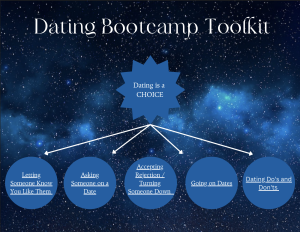 MAIER’s Dating Bootcamp Toolkit will assist you in considering and learning how to engage in what are sometimes tricky aspects of dating, like letting someone know you like them, asking someone on a date, accepting rejection and/or turning someone down, going on dates, and dating do’s and don’ts. Dating takes a lot of interpersonal skills, often skills not elaborated on or explained. This toolkit helps to break down these social skills in a way that is accessible and easy to understand. Along with the Dating Bootcamp Toolkit, be sure to check out MAIER’s PEERS lab. There are asynchronous online training modules HERE you can take at your convenience on subjects like Dating Bootcamp, and another module is on Friendship Skills Bootcamp.
MAIER’s Dating Bootcamp Toolkit will assist you in considering and learning how to engage in what are sometimes tricky aspects of dating, like letting someone know you like them, asking someone on a date, accepting rejection and/or turning someone down, going on dates, and dating do’s and don’ts. Dating takes a lot of interpersonal skills, often skills not elaborated on or explained. This toolkit helps to break down these social skills in a way that is accessible and easy to understand. Along with the Dating Bootcamp Toolkit, be sure to check out MAIER’s PEERS lab. There are asynchronous online training modules HERE you can take at your convenience on subjects like Dating Bootcamp, and another module is on Friendship Skills Bootcamp.
De-escalating Challenging Behavior
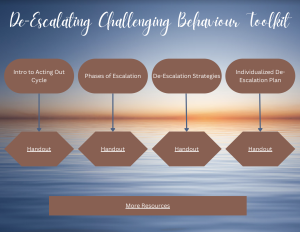 MAIER’s de-escalating challenging behavior toolkit is a resource that will help you to understand the acting out cycle, learn the phases of escalation, consider de-escalation strategies, and create an individualized de-escalation plan. These tools can be used as needed again and again. Along with this de-escalating toolkit, MAIER also has an entire professional development course on de-escalation strategies freely available asynchronously online, so you can do it when it fits your schedule. Check out that particular course HERE and other professional development courses and modules at MAIER’s website HERE.
MAIER’s de-escalating challenging behavior toolkit is a resource that will help you to understand the acting out cycle, learn the phases of escalation, consider de-escalation strategies, and create an individualized de-escalation plan. These tools can be used as needed again and again. Along with this de-escalating toolkit, MAIER also has an entire professional development course on de-escalation strategies freely available asynchronously online, so you can do it when it fits your schedule. Check out that particular course HERE and other professional development courses and modules at MAIER’s website HERE.
Sexuality Education Toolkit
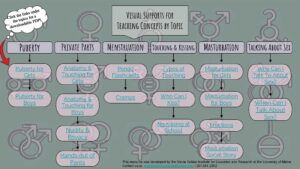
MAIER’s Sexuality Education Resource will link you to a variety of resources, all in a handy graphic to lead you through topics and conversations, many specifically developed for families of children, teens, and young adults with special learning needs. Check out this new resource, which includes links to helpful videos, visual supports, curricula, and toolkits, then share with others to help spread the word! Read more about the Sexuality Toolkit here. View and/or download Sexuality Education Resource here
Healthy Lifestyle Toolkit
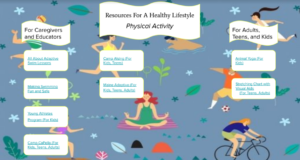 The Healthy Lifestyle Toolkit, developed by Sara Hunt, a recent UMaine graduate in Child Development & Family Relations, explores a myriad of resources befitting for parents, caregivers, educators, kids, teens, and adults! Within the toolkit, you’ll find direct links to social stories, strategies, training videos, and more pertaining to physical activity, nutrition, sleep, hygiene, and social/emotional wellness. Read more about the Healthy Lifestyle Toolkit here. View and/or download the Healthy Lifestyle Toolkit here!
The Healthy Lifestyle Toolkit, developed by Sara Hunt, a recent UMaine graduate in Child Development & Family Relations, explores a myriad of resources befitting for parents, caregivers, educators, kids, teens, and adults! Within the toolkit, you’ll find direct links to social stories, strategies, training videos, and more pertaining to physical activity, nutrition, sleep, hygiene, and social/emotional wellness. Read more about the Healthy Lifestyle Toolkit here. View and/or download the Healthy Lifestyle Toolkit here!
Early Childhood Settings Inclusion Toolkit
 This Early Childhood Settings Inclusion Toolkit was developed through a collaborative commitment by a cross-agency state leadership team; the Maine Department of Education – Child Development Services, the Maine Department of Health and Human Services, Child Care and Head Start, and the Center for Community Inclusion and Disability Studies, to support early childhood programs in providing high-quality inclusive settings for young children and their families.
This Early Childhood Settings Inclusion Toolkit was developed through a collaborative commitment by a cross-agency state leadership team; the Maine Department of Education – Child Development Services, the Maine Department of Health and Human Services, Child Care and Head Start, and the Center for Community Inclusion and Disability Studies, to support early childhood programs in providing high-quality inclusive settings for young children and their families.
These resources are useful for individuals thinking about starting a program as well as for staff currently working in early childhood settings. This toolkit is designed to help fuel your curiosity about every child and setting that can support all children, including any child with a special need. You can look at your program through the eyes of each child and decide if there are any changes you might want to consider.
Videos
CEC DADD Conference Recordings July 21, 2023
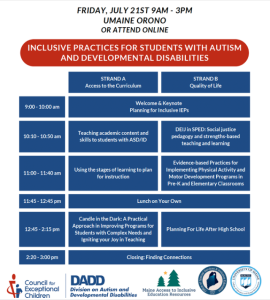 The Council for Exceptional Children Division on Autism and Developmental Disabilities (CEC DADD) hosted a Summer Symposium at the University of Maine on July 21, 2023. The division worked in collaboration with the UMaine College of Education and Human Development, Maine Access to Inclusive Education Resources (MAIER), and Maine Department of Education Office of Special Services and Inclusive Education to bring this conference to UMaine. Once you register, all links to the video recording of each session, the handouts and/or powerpoints the presenters used, and if you would like CEU’s for watching these sessions are available. If you have any issues or questions email MAIER’s Research Associate. Free registration HERE.
The Council for Exceptional Children Division on Autism and Developmental Disabilities (CEC DADD) hosted a Summer Symposium at the University of Maine on July 21, 2023. The division worked in collaboration with the UMaine College of Education and Human Development, Maine Access to Inclusive Education Resources (MAIER), and Maine Department of Education Office of Special Services and Inclusive Education to bring this conference to UMaine. Once you register, all links to the video recording of each session, the handouts and/or powerpoints the presenters used, and if you would like CEU’s for watching these sessions are available. If you have any issues or questions email MAIER’s Research Associate. Free registration HERE.
McKinney-Vento Program 101
 Watch a recorded webinar HERE of Maine’s Department of Education’s Amelia Lyons, presenting the McKinney-Vento program. This webinar provided an overview of the act that allows each state to provide a program to assist students with their rights when they are experiencing unstable housing situations. Participants learn about student rights including the rights to immediate school enrollment even when records are not present, remaining in the school of origin, if in the student’s best interest, receiving transportation to and from the school of origin, and receiving support for academic success. Amelia Lyons went over the McKinney-Vento Act, common misconceptions of the program (i.e., that students need to be homeless to participate), and ways educators and family members can help their youth receive these services so that every student can have an opportunity for academic success. Link HERE.
Watch a recorded webinar HERE of Maine’s Department of Education’s Amelia Lyons, presenting the McKinney-Vento program. This webinar provided an overview of the act that allows each state to provide a program to assist students with their rights when they are experiencing unstable housing situations. Participants learn about student rights including the rights to immediate school enrollment even when records are not present, remaining in the school of origin, if in the student’s best interest, receiving transportation to and from the school of origin, and receiving support for academic success. Amelia Lyons went over the McKinney-Vento Act, common misconceptions of the program (i.e., that students need to be homeless to participate), and ways educators and family members can help their youth receive these services so that every student can have an opportunity for academic success. Link HERE.
Multi-tiered Systems of Support: Timely Instruction for All Students By, Dr. Rachel Brown-Chidsey 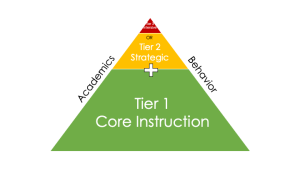
This video provides an overview of the components in a multi-tiered system of support (MTSS) and how students with disabilities can and should participate within all tiers. Observers will learn the importance of a strong Tier 1 core instruction foundation for all students as well as how targeted (Tier 2) and intensive (Tier 3) supports are provided for students regardless of dis/ability. The video concludes with action steps that educators can take to ensure that their students are included within all tiers of support, as appropriate.
The video (HERE) is presented by Dr. Rachel Brown Chidsey, a nationally renowned expert in multi-tiered systems of support for academics, and inclusive teaching practices. She has more than 25 years of experience in education and has authored dozens of articles, and many books on supporting struggling learners and students with disabilities. She is currently the president of the Maine State Council for Exceptional Children.
Self-Advocacy Module, Session 1: 
In this video, Connor Archer discusses what self-advocacy is, gives suggestions about what works, and brings up thought-provoking ideas and ways of thinking about becoming your own best advocate. You know yourself and your needs best, use Connor’s video, tool kit (linked above) and attend his Q & A sessions to leverage your voice effectively and respectfully.
Self-Advocacy Module, Session 2:
In this video, Connor Archer interviews Dylan Campbell, Maine Parent Federation’s (MPF) Youth Coordinator, about the amazing cadre of resources available via MPF, what Dylan thinks about self-advocacy, and what he has seen challenge as well as work for his clients. Along with the session 1 video and the self-advocacy tool kit above, attend Connor’s future Q & A sessions to leverage your voice effectively and respectfully.
Self-Advocacy Module, Session 3:
In this video, Connor Archer interviews Jessica Archer, Connor’s mom an amazing educator and advocate, about the right kinds of questions to be asking when they consider self-advocacy. What kinds of strategies can you come up with to know what questions to ask when in order to make the most impact? Along with the earlier session videos and the self-advocacy tool kit above, attend Connor’s future Q & A sessions to leverage your voice effectively and respectfully.
Self-Advocacy Module, Session 4:
In this video, Connor Archer goes over strategies on how to hold firm when asking questions and seeking changes with accommodations. He then recapped the topics shared throughout the series. Along with the earlier session videos and the self-advocacy tool kit above, you will learn how to leverage your voice more effectively and respectfully in this video.
Supporting Literacy Development, Access, and Communication for Home and School:
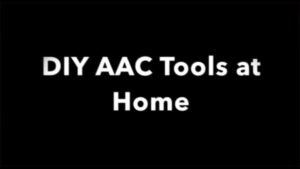
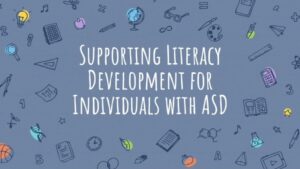
New videos developed by Haley Usilton, UM graduate student in Communication Sciences and Disorders, to support the use of
augmentative and alternative communication at home and at school and supporting literacy development, access, and communication.
